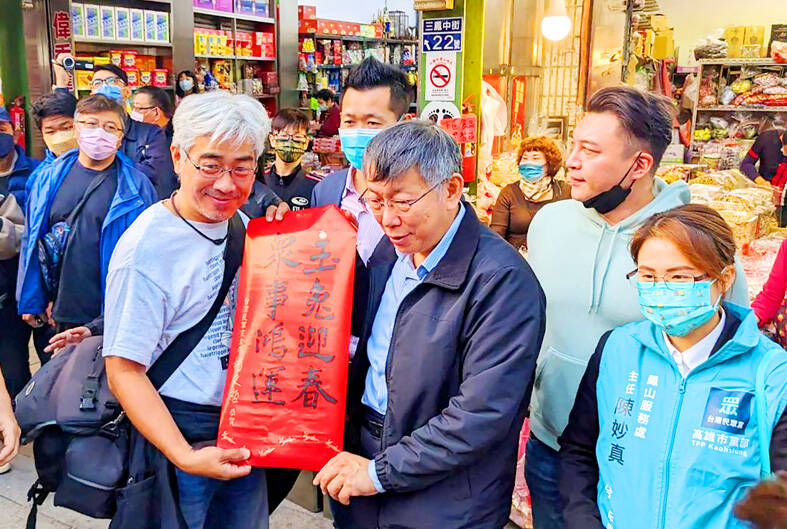Taiwan People’s Party (TPP) Chairman Ko Wen-je (柯文哲) is planning a trip to the US in the spring after retiring from National Taiwan University Hospital on Feb. 1, TPP Secretary-General Tom Chou (周台竹) said on Thursday.
The trip would not be short, but would finish within four weeks, he said.
While in the US, Ko plans to visit government offices, legislators and think tanks, and meet with people in the defense industry, Chou said.

Photo: CNA
Ko hopes to express to his hosts that Taiwan has limited funds to purchase military equipment and would buy only what is suitable for its defensive needs, Chou said.
The former Taipei mayor also plans to visit the US Congress to thank Taiwan-friendly lawmakers for their support, he added.
The plan is part of a new push by Ko and the TPP to prepare the party for next year’s presidential election.
Ko has submitted his retirement notice to National Taiwan University Hospital, and reportedly plans to open a personal office after the Lunar New Year holiday.
Chou, who has more than 30 years of diplomatic experience, was appointed as the party’s new secretary-general on Jan. 3, and has been tasked with formulating its diplomatic and cross-strait policies.
The TPP on Jan. 8 also established the affiliated Taiwan New Homeland Think Tank Association, as well as an internal policy think tank to establish policy suggestions on foreign, defense and internal administration affairs.
Former Taiwan Solidarity Union chairman Shu Chin-chiang (蘇進強), who was expelled over a 2014 visit to China, was tapped as CEO of the New Homeland association.
The think tank is to present a “third force” in Taiwanese politics during the election by consolidating views from different parties and experts, Shu said.
The proposals put forward by the think tank are to reflect major national policies and issues of concern to the people, he said.
Shu said he advised Ko to extend his sights beyond Taipei and consider what is feasible to create a strategy for Taiwan’s development.
Ko is to serve as chairman of the New Homeland think tank, with TPP Legislator Jang Chyi-lu (張其祿) and former party secretary-general Hsieh Li-kung (謝立功) serving as vice chairmen.
The think tank includes many former heads of departments under the Taipei City Government and members of other political parties, Hsieh said.
The scope of policies covered would therefore be larger than internal party think tanks, he said, adding that he hopes it provides advice for the 2024 election and on national development.

Taiwan has received more than US$70 million in royalties as of the end of last year from developing the F-16V jet as countries worldwide purchase or upgrade to this popular model, government and military officials said on Saturday. Taiwan funded the development of the F-16V jet and ended up the sole investor as other countries withdrew from the program. Now the F-16V is increasingly popular and countries must pay Taiwan a percentage in royalties when they purchase new F-16V aircraft or upgrade older F-16 models. The next five years are expected to be the peak for these royalties, with Taiwan potentially earning

STAY IN YOUR LANE: As the US and Israel attack Iran, the ministry has warned China not to overstep by including Taiwanese citizens in its evacuation orders The Ministry of Foreign Affairs (MOFA) yesterday rebuked a statement by China’s embassy in Israel that it would evacuate Taiwanese holders of Chinese travel documents from Israel amid the latter’s escalating conflict with Iran. Tensions have risen across the Middle East in the wake of US and Israeli airstrikes on Iran beginning Saturday. China subsequently issued an evacuation notice for its citizens. In a news release, the Chinese embassy in Israel said holders of “Taiwan compatriot permits (台胞證)” issued to Taiwanese nationals by Chinese authorities for travel to China — could register for evacuation to Egypt. In Taipei, the ministry yesterday said Taiwan

Taiwan is awaiting official notification from the US regarding the status of the Agreement on Reciprocal Trade (ART) after the US Supreme Court ruled US President Donald Trump's global tariffs unconstitutional. Speaking to reporters before a legislative hearing today, Premier Cho Jung-tai (卓榮泰) said that Taiwan's negotiation team remains focused on ensuring that the bilateral trade deal remains intact despite the legal challenge to Trump's tariff policy. "The US has pledged to notify its trade partners once the subsequent administrative and legal processes are finalized, and that certainly includes Taiwan," Cho said when asked about opposition parties’ doubts that the ART was

If China chose to invade Taiwan tomorrow, it would only have to sever three undersea fiber-optic cable clusters to cause a data blackout, Jason Hsu (許毓仁), a senior fellow at the Hudson Institute and former Chinese Nationalist Party (KMT) legislator, told a US security panel yesterday. In a Taiwan contingency, cable disruption would be one of the earliest preinvasion actions and the signal that escalation had begun, he said, adding that Taiwan’s current cable repair capabilities are insufficient. The US-China Economic and Security Review Commission (USCC) yesterday held a hearing on US-China Competition Under the Sea, with Hsu speaking on